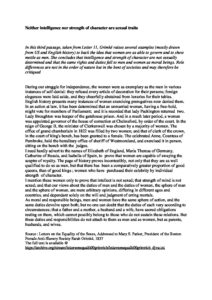In this third passage, taken from Letter 11, Grimké raises several examples (mostly drawn from US and English history) to back the idea that women are as able to govern and to show mettle as men. She concludes that intelligence and strength of character are not sexually determined and that the same rights and duties fall to men and women as moral beings. Role differences are not in the order of nature but in the bent of societies and may therefore be critiqued
During our struggle for independence, the women were as exemplary as the men in various instances of self-denial: they refused every article of decoration for their persons; foreign elegances were laid aside, and they cheerfully abstained from luxuries for their tables.
English history presents many instances of women exercising prerogatives now denied them. In an action at law, it has been determined that an unmarried woman, having a free-hold, might vote for members of Parliament; and it is recorded that lady Packington returned two. Lady Broughton was keeper of the gatehouse prison. And in a much later period, a woman was appointed governor of the house of correction at Chelmsford, by order of the court. In the reign of George II, the minister of Clerkenwell was chosen by a majority of women. The office of grand chamberlain in 1822 was filled by two women; and that of clerk of the crown, in the court of king’s bench, has been granted to a female. The celebrated Anne, Countess of Pembroke, held the hereditary office of sheriff of Westmoreland, and exercised it in person, sitting on the bench with the judges.
I need hardly advert to the names of Elizabeth of England, Maria Theresa of Germany, Catharine of Russia, and Isabella of Spain, to prove that women are capable of swaying the sceptre of royalty. The page of history proves incontestibly, not only that they are as well qualified to do so as men, but that there has been a comparatively greater proportion of good queens, than of good kings ; women who have purchased their celebrity by individual strength of character.
I mention these women only to prove that intellect is not sexed; that strength of mind is not sexed; and that our views about the duties of men and the duties of women, the sphere of man and the sphere of woman, are mere arbitrary opinions, differing in different ages and countries, and dependant solely on the will and judgment of erring mortals.
As moral and responsible beings, men and women have the same sphere of action, and the same duties devolve upon both; but no one can doubt that the duties of each vary according to circumstances; that a father and a mother, a husband and a wife, have sacred obligations resting on them, which cannot possibly belong to those who do not sustain these relations. But these duties and responsibilities do not attach to them as men and as women, but as parents, husbands, and wives.
